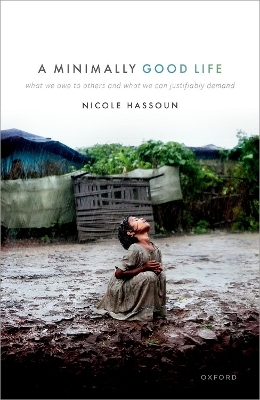
A Minimally Good Life
Oxford University Press (Verlag)
978-0-19-285615-9 (ISBN)
What do we owe to each other simply out of respect, or concern, for our common humanity? What can we claim? The United Nations' Sustainable Development Goals and the Universal Declaration of Human Rights as well as many states' constitutions embody competing answers to these questions. Different accounts of what we owe to others out of concern for our common humanity ground divergent accounts of the basic minimum just societies and the international community must help people secure.
A Minimally Good Life argues that concern for our common humanity requires helping others live minimally good lives when doing so does not require sacrificing our own ability to live well enough. This, it suggests, provides a unified answer to the question of what we must give to, and can demand from, others as a basic minimum. More precisely, Nicole Hassoun argues that people must obtain the things that let them secure the relationships, pleasures, knowledge, appreciation, worthwhile activities, and other things that a reasonable and caring person free from coercion and constraint would set as a minimal standard of justifiable aspiration. That is, as reasonable, caring, free people, we should put ourselves into each other's shoes and think about what we need to live well enough as each person. Hassoun makes this case by engaging with the main competitors in the literature: those that offer different accounts of the basic minimum and the limits of our obligations. She then defends a new way of helping people in present and future generations reach the sufficiency threshold and of responding to apparent tragedy when helping everyone seems impossible.
Nicole Hassoun is Research Director in the Collegium for Advanced Studies at the University of Helsinki and Professor of Philosophy at Binghamton University. She has held visiting positions at Cornell University, the United Nation's World Institute for Development Economics Research, the Center for Poverty Research in Austria, and the Center for Advanced Studies in Frankfurt. Hassoun is the author of Global Health Impact: Extending Access to Essential Medicines (2020) and Globalization and Global Justice: Shrinking Distance, Expanding (2012) and has published widely in leading philosophy, economics, tropical medicine, and public health journals.
Introduction
1: The Account of the Minimally Good Life
2: Good Enough? Other Accounts of the Minimally Good Life
3: The Minimally Good Life and Basic Justice
4: Advantages of the Minimally Good Life Account of What We Owe to Others and What We Can Justifiably Demand Over the Main Alternatives
5: Helping People Live Minimally Well in Present and Future Generations
6: Hope and Virtue of Creative Resolve
Conclusion
Appendix I
Appendix II
Appendix III
| Erscheinungsdatum | 22.08.2024 |
|---|---|
| Verlagsort | Oxford |
| Sprache | englisch |
| Maße | 161 x 242 mm |
| Gewicht | 420 g |
| Themenwelt | Geisteswissenschaften ► Philosophie ► Ethik |
| Sozialwissenschaften ► Soziologie | |
| ISBN-10 | 0-19-285615-4 / 0192856154 |
| ISBN-13 | 978-0-19-285615-9 / 9780192856159 |
| Zustand | Neuware |
| Haben Sie eine Frage zum Produkt? |
aus dem Bereich


